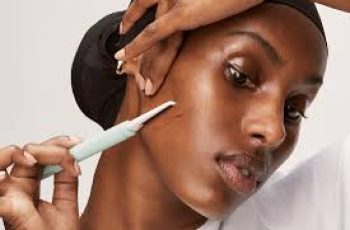Should I use a serum or moisturizer first?
Finding the best routine for your skin and lifestyle has never been easier. I have to admit that we are spoilt for choice when it comes to effective formulas that provide the best results. Despite all these positives, there is one downside that just won’t go away and that is the confusion about which product should be applied to the skin first. If you have ever wondered about this, hopefully today will clear things up. So let’s find out together how to use your skin care routine the right way and which product should be applied first: serum or moisturizer.
Which should I use first, serum or moisturizer?
You will find that serums applied first will absorb into the skin quickly and usually do not leave a greasy residue. Since they are much lighter than moisturizers, it is best to apply a serum beforehand. Avoid using them after moisturizers as they are usually thicker creams and the oils in their formula will form a barrier on the skin, making it difficult for the serum to reach the lower dermis. When moisturizer is applied over a serum, the barrier created by the moisturizer is more effective, helping to fight the damage caused by environmental aggressors such as cold weather, UV rays and wind.
In what order should you perform your skin care routine?
Below are some examples of simple yet effective skin care routines that can be used morning and night. Not to mention, you can change or add additional steps if you want or need to.
Morning Routine:
Cleanser/Face Cleanser
Chemical Exfoliant Toner
Serum
Eye Cream
Moisturizer
SPF 30 and above
Evening Routine:
Makeup Remover
Cleanser/Face Cleanser
Chemical Exfoliant Toner (if not used in the morning)
Serum
Eye Cream
Night Moisturizer
Facial Oil (optional)
Night Mask (optional)
As I mentioned, you can mix and match these products to best suit the feel and look of your skin. Keep in mind that the ingredients also play an important role and must be taken into account when using them together in your daily routine.
How Long Should You Wait Between Serum and Moisturizer?
It is believed that you should pay close attention to how long you should wait after your serum before applying your moisturizer to get the best results for your skin. Similar to applying moisturizer at the right time, there are other methods and habits you can adopt in your skin care routine to keep your skin looking and feeling its healthiest.
To ensure you get the most out of your skin care routine, especially serums and moisturizers, there are a few things to keep in mind:
Always make sure your skin is thoroughly cleansed and cleared of any accumulated dead skin cells so that the serum can be optimally absorbed when applied to the skin.
Apply to damp skin, especially if your serum contains moisturizing ingredients like niacinamide and hyaluronic acid.
Less is more. Don’t forget that serums are highly concentrated, i.e. you don’t need much to achieve results.
Wait, then moisturize. When a serum is well formulated, it absorbs quickly into the skin and disappears into it effectively. The ideal time to let a serum fully absorb is about 5 minutes before applying your moisturizer.
These are some tips on how to keep your skin looking its best and how to make the most of the active ingredients and powerful skin care products you use every day.
Can you use 2 serums on your face?
You actually can! However, it is considered best for the skin to use no more than 2 in any skin care routine. They are also very effective when used on top of each other. However, there are a few tips you should keep in mind to avoid unwanted skin reactions.
Watch out for ingredients
When using serums with active ingredients that don’t work well together, this can often be the main cause of unexpected skin reactions. If you use ingredients like retinol or vitamin C, it’s best to use them separately for the best results without added irritation.
Don’t exfoliate too hard
Exfoliating too hard can strip your skin of the important oils and moisture it needs to stay healthy. If you then apply a serum on top, you may find that it’s not as effective because it either overcompensates and helps the skin regenerate itself, or causes irritation and sensitivity.
Limit use to 2 serums
When you use two serums with complementary formulas, you’ll find that your skin is constantly benefiting from the different ingredients, vitamins, and minerals in the mix. They fight signs of aging, loss of firmness, uneven skin tone, and counteract other free radical damage caused by pollution, central heating, and environmental skin stressors.
Don’t forget to take care of your skin
Using multiple serums doesn’t mean you never have to use a moisturizer or facial oil again. These products target different skin areas and provide comprehensive protection for the face. If you want to provide your face with extra moisture and nourishment, you can use facial oils and moisturizers, both of which are formulated with powerful ingredients to restore and regenerate the skin while protecting the serum that works in the lower layers of the skin.
Which is better, serum or moisturizer?
Using these products together will significantly improve your complexion, especially if you have a drier and more sensitive skin type that is prone to skin conditions. While moisturizer forms a protective shield over the skin and prevents damage from external influences, it also slows down the evaporation of moisture from the skin. While the skin is protected, you can expect the serum to work in the lower dermis to benefit the complexion by restoring and repairing deep-rooted damage that occurs over time.
I hope you found this article useful today and helped you solve some of your skin problems! Don’t forget that you can find us on Instagram if you have any questions. Our direct messages are always open.
DQH Knowledge drop: In your 20s, your skin cell turnover decreases. (Cell turnover is a key component in keeping your skin youthful.) You know what else slows down? Your collagen production. Starting in your 20s, collagen decreases by about 1 percent per year. Should you want to prevent fine lines and wrinkles, start by eliminating behaviors that contribute to premature aging. “If it’s bad for you, it’s bad for your skin,” says dermatologist Michel Somenek.
“Cigarette smoking reduces blood flow to the skin and causes premature wrinkling and a dull skin texture. Making the repeated pursed motion to inhale can also cause smoker’s lines. Alcohol and recreational drugs are toxins for the skin that damage its cellular structure and DNA,” Somenek tells us. “The faster you eliminate vices while you are young, the better chance your skin and body have to recuperate.” Also, adopting an anti-aging routine in your 20s is key. After all, the best offense is a good defense. We spoke to Somenek and experts Joshua Ross and Audrey Kunin to find out more.
Keep reading for the best anti-aging products for your 20s, according to skincare professionals.
Sunscreen
“We all know that the sun is the number one cause of skin aging and starting the prevention in your 20s is very important,” Ross says. “The majority of your sun damage won’t start to appear until you’re in your 30s, so don’t wait until you see it surface or you’ll be behind the curve. Stay ahead of it with a good-quality zinc-based sunscreen worn daily.”
Farmacy Green Defense Daily Mineral Sunscreen
An invisible sunscreen with SPF 30, plus botanical extracts meant to protect skin with tons of antioxidants. Bonus: It’s clean and fine to use under makeup.
Bareminerals Complexion Rescue™ Tinted Moisturizer Broad Spectrum SPF 30
Although we recommend you use your SPF and moisturizer separately, we also understand moments when you don’t have time or energy for that extra step. For those times, this bareMinerals moisturizer is a great thing to have on hand.
Vitamin C Serum
“A great introduction to anti-aging is to start with a vitamin C serum in your morning skincare routine,” Ross says. “It’s a powerful antioxidant that will neutralize free radicals and brighten the skin.” He adds that it’s a great way to counteract the effects of the sun’s harmful rays, which, as previously mentioned, are among the biggest causes of premature aging.
Drunk Elephant C-Firma™ Vitamin C Day Serum
The Drunk Elephant C-Firma is a lightweight serum that promises to give skin a glow by combining the brightening powers of vitamin C with ferulic acid, l-ascorbic acid, and vitamin E. The included sodium hyaluronate is meant to replace hydration loss, so you shouldn’t have to deal with any irritation.
Sunday Riley C.E.O. Rapid Flash Brightening Serum
This potent serum is jam-packed with vitamin C (15 percent, to be exact), which means it’s a potential superstar at both brightening skin and dousing it in antioxidants.
Peptides
Using peptides on your skin has many benefits, says Somenek. “The skin barrier is what defends the body against pollution, UV rays, bacteria, and toxins. It can be damaged by several everyday factors. Using topical peptides aids in building a stronger barrier,” he says. “Peptides comprise elastic fibers, which are a type of protein. These fibers help to make skin appear taut and firm. Peptides can also help repair damaged skin, relieve inflammation, and even out skin tone. Some peptides can kill acne-causing bacteria that is common in 20-somethings.”
Kunin agrees, saying, “Peptides are an excellent entry point for supporting collagen.” She recommends looking for face and eye treatments that contain these collagen-boosting powerhouses.
Charlotte Tilbury Magic Eye Rescue Cream
This Charlotte Tilbury super-emollient eye cream has a base of coconut oil and shea butter (read: it’s incredibly hydrating). Botanicals plus peptides are meant to help reduce dark circles and boost collagen, respectively.
This creamy moisturizer serves up potent collagen-boosting peptides and pycnogenol, and antioxidant-rich vitamin C. “Instead of sitting on top of the skin, peptides penetrate the outer layer so they go deep. The ‘signals’ they send tell the cells to produce elastin and collagen, which are needed for youthful-looking skin,” explains Somenek.
At-Home Peel Pads
Remember that skin cell turnover fiasco we talked about earlier? One way to help support it is by exfoliating. “Exfoliation is important to help keep skin fresh and luminous,” Kunin says. She recommends using at-home peel pads as an easy and effective way to exfoliate.
“The goal in your 20s is to fight the slowing pace of cell turnover. It is wise to use products that gently exfoliate, yet still remove oil and other impurities. Products that have Alpha Hydroxy Acids (AHA) or Beta Hydroxy Acids (BHA) are a good choice.”
According to Somenek, you should only exfoliate two to three times a week. “People of all ages are guilty of over-exfoliating and that can be too much of a good thing,” he says.
Dermadoctor Kakadu C Intensive Vitamin C Peel Pad
A few swipes of this Derma Doctor powerful peel pad promise to leave your skin glowing and smooth, thanks to the seven (yes, seven) types of chemical exfoliants, including AHA and BHA. It also contains vitamin C via Kakadu plum extract for added brightening and antioxidant protection.
KEY INGREDIENTS Kakadu plum extract is sourced from the Kakadu plum, a fruit grown in northern Australia. It contains vitamin C, which restores the skin’s natural barrier, increases collagen production, and soothes irritation.
Dr. Dennis Gross Skincare Alpha Beta® Universal Daily Peel Pads
These are the gold standard of peel pads, with a cult following and over 900 five-star reviews on Sephora. They’re easy to use and contain a blend of anti-aging exfoliating acids.
Emollient Night Cream
“In your 20s, you need to start upping the hydration in your skincare routine. You may have been cautious of over-moisturizing because of acne in your teens, but as you enter your 20s, your skin transitions and becomes drier,” Ross says. “I recommend an emollient night cream added into your evening skincare regimen.”
“Twenty-somethings need to make sure that they are not using creams that will clog their pores and cause excess oil production,” says Somenek. Opt for non-comedogenic products.
Cerave Skin Renewing Night Cream
One great choice is the CeraVe Skin Renewing Night Cream, which is a non-comedogenic night cream that leaves skin soft and glowy. It combines the moisturizing powers of ceramides and hyaluronic acid.
RoC Retinol Correxion Max Hydration Creme
“The best night cream ingredients contain retinol, benzoyl peroxide, and/or salicylic acid or hyaluronic acid. The goal is to moisturize, yet remove excess oil,” says Somenek. This Roc Retinol Correxion cream fits the bill as it contains both hyaluronic acid and retinol so it promises to moisturize while also being non-comedogenic.



